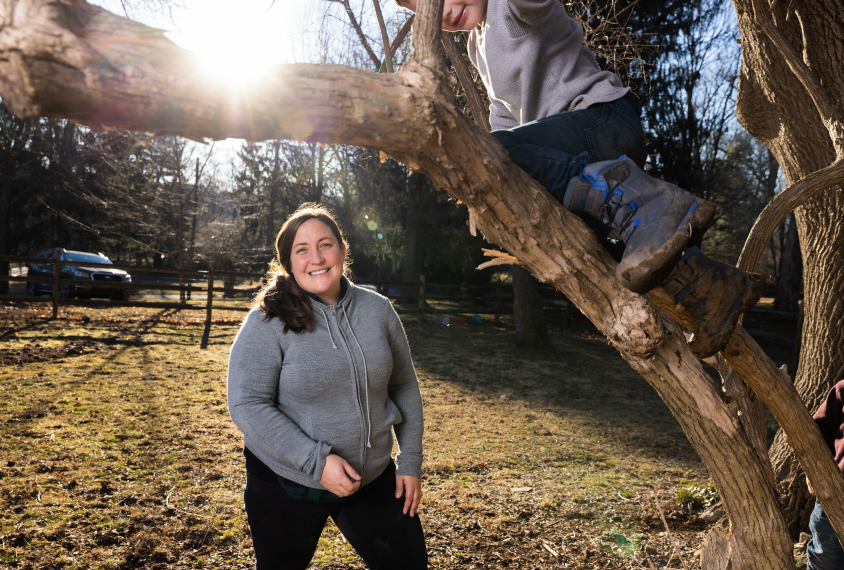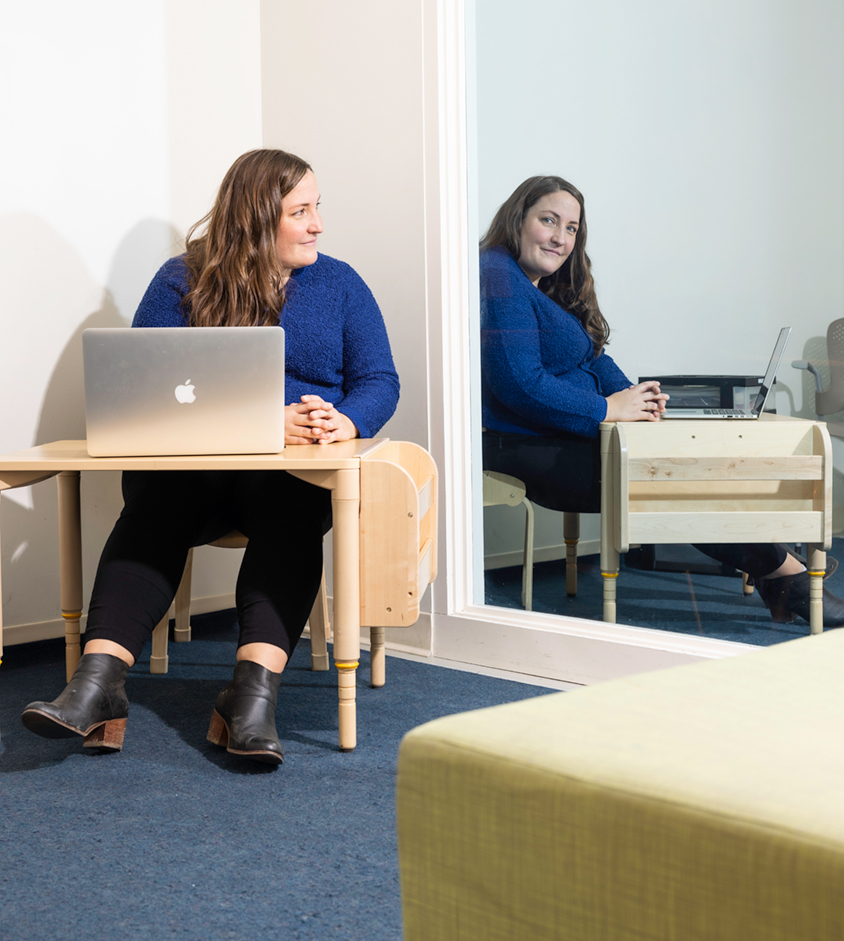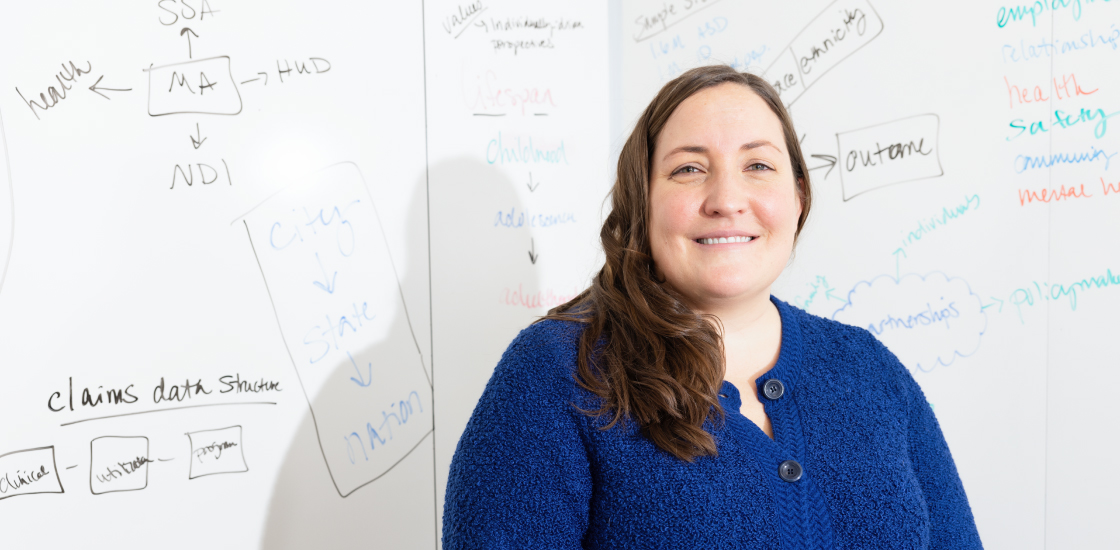Lindsay Shea’s workdays are “windows of chaos,” she says — too much time on Zoom in her basement office, followed by late afternoons with her family and another work session after her three children go to bed.
Amid the mayhem, though, she manages to bring a laser focus to reforming autism research and clinical care, a goal she has had since her first job out of college as a research assistant. Working on a new autism screening tool, she witnessed hospital clinicians putting in long, intense hours to see families desperate for their expertise — while the hospital pushed them to make visits shorter so they could see more patients.
“The hospital system was a huge barrier to both families and clinicians getting what they needed, which pointed me directly to the need for systems-level reform,” says Shea, now director of the Policy and Analytics Center, leader of the Life Course Outcomes Research Program and associate professor of health management and policy at the A.J. Drexel Autism Institute in Philadelphia, Pennsylvania.
Shea heads up projects at the local, state, federal and global level, analyzing big data to help guide policies and programs that affect autistic people and their caregivers. She led the Pennsylvania Autism Census Report, the first statewide administrative census of autistic individuals in the United States, and she oversees the Philadelphia Autism Project, which, in conjunction with the city council, promotes an array of city-level partnerships across systems of care, including Medicaid, the justice system and the school system.
She spoke with Spectrum about her work, her “dirt kitchen,” fried sticky buns and why her lab doesn’t have a mascot.
Spectrum: What big question drives your research?
Lindsay Shea: Why does it take research so long to reach policy and practice? I’m more passionate now than ever that we must do better with our partnerships, that we craft research questions to be meaningful and useful, and that we communicate our research results in a timely and understandable ways to make an impact.
S: How did you become interested in this to begin with?
LS: I’m from a family of lawyers and people with roles in policy processes who seek evidence-based and meaningful ways to address questions and problems in front of them. They react to problems or look for new solutions that immediately impact large groups of people, including entire states, but they keep this research behind paywalls, and they don’t produce it in ways that people can digest and use.
On the flip side, researchers look for connections to communities and the policymakers who represent them to drive important research questions. The disconnect between these groups, and the ways our communities can benefit from them working together, has been the primary theme for my work.
S: How did you become interested in autism?
LS: As with many of my colleagues, I’ve had people in my life affected by autism. Seeing and experiencing how much information was and continues to be missing made it feel urgent and important.
S: What kind of missing information about autism do you mean?
LS: In my first encounters with autism in the early 2000s, there was still little known about why autism occurred or was increasing, and the vaccine issue was very prominent. The lack of information caused confusion and tension, and often disrupted how families supported each other. We know more today, but we still haven’t figured out how to get information to people who need it ways that are easy and supportive during what is often a stressful, hard time.
S: Where are you from? How did that shape you?
LS: I’m from a small town in the middle of Pennsylvania, which taught me that I love being in the woods and outdoors and that fried sticky buns are an absolutely acceptable breakfast staple.
S: What do you do for fun?
LS: I love being outside with my kids, and long solo hikes with our dogs top my list. Philly has a decent music scene my husband and I used to enjoy and that we hope we can get back into in a COVID-19 manageable world.
I spend weekends at sports for my kids or outside hiking, walking a trail or overseeing a project in our garden, our “dirt kitchen.”

S: Can you talk about your lab philosophy?
LS: We work really hard to “keep it real,” using research approaches that make a difference today. We’re adapting new practices to help us walk the walk of translating our research results to make an impact, and we value authentically the partnerships we have to help us understand and work with communities.
S: When and where are you most productive?
LS: At night, when my house is quiet and calm, I usually get a second wind that has gotten me through many grants and manuscripts. I relocate to other areas of my house or outside for a fresh backdrop — highly recommended!
S: Whose work do you admire, and why?
LS: Lisa Croen has generated incredible research that has guided the field and provided important markers of what we measure and how. I’m fortunate to be in her orbit on a project now, but I have long followed and admired her work.
S: Who would you love to work with and haven’t yet?
LS: Aubyn Stahmer. Her work in communities and engaging state decision-makers is amazing. She’s been generous with her time when I’ve reached out to her, but I’d love to collaborate more closely.
S: Do you have a mentor?
LS: I was in the very fortunate position to work with David Mandell for several years early in my career, and I’ve made it my mission to connect with him often enough that he hasn’t been able to shake me free. He’s been an incredible support for me professionally and personally, as he has for many of us. I still read everything he puts out and learn from it.
S: Have you had any memorable experiences at research conferences?
LS: Several times I’ve found myself sitting next to a colleague who is a policymaker or a family member or both, and as they’re hearing research presentations about failures of the health-care system during the transition to adulthood or other suboptimal outcome, they’ve told me how it sounds exactly like their experiences 20 or 30 years ago. It blows my mind every time that experiences are not changing, especially given all the research we produce!
S: How has the COVID-19 pandemic affected your research?
LS: My team can and does operate primarily remotely, and it’s been truly disorienting to have team members whom I’ve never met come and go. I’m excited about the opportunities to recruit and work with people in a wider range of settings, though.
S: Which journals and magazines do you read most?
LS: I read everything Health Affairs produces, the American Journal of Public Health, and follow The Incidental Economist religiously.
S: What are you reading right now?
LS: I may work in neurodevelopment, but because I focus on policy and the use of secondary or administrative data, I have almost no training in how kids experience development and growth. As a parent, I’m always reading books about baby brains or child development in hopes there’s a decoder ring out there.

S: Are you active on social media?
LS: Our new Policy Impact Project is active on Twitter, and several of our local initiatives, including the Philly Autism Project, really represent what’s happening in our communities on Instagram and elsewhere in the social media-verse.
S: How many unread emails are in your inbox right now?
LS: Zero unread emails is my daily compulsion.
S: Does your lab have any traditions?
LS: We have a solid team of conversation starters, so our team check-in meetings almost always involve lots of laughing and self-disclosures, like the types of candy people hate or over-rated food combos.
S: Does your lab have a mascot?
LS: No lab mascot — Philly has hit our quota for confusing, entertaining mascots!





